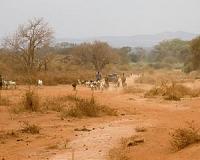 |
Canberra, Australia (SPX) Mar 26, 2010 CSIRO and Bayer CropScience are embarking on a new two-year research program designed to assess the sustainability of new generation crops. This collaboration will develop and apply models to assess the system-wide consequences of new-generation cereal crops in the face of global environmental and food security challenges. The project will assess the full environmental impact of the crops, including their influence on the carbon footprint of cereal production. This program will build on a long-term cereal research agreement between the two organisations. The Director of CSIRO�s Sustainable Agriculture Flagship, Dr Brian Keating, said new generation crops offer enormous potential to help Australia and the rest of the world deal with the future demand for food. "Through reduced input requirements and improved efficiency in the use of water, energy and nutrients, they also have the potential to reduce pressure on the environment, including reduction of greenhouse emissions that contribute to climate change," Dr Keating said. "This cooperation with Bayer fits perfectly with the top-line objective of the Sustainable Agriculture Flagship which is to raise agricultural productivity by 50 per cent by 2030, while halving carbon emissions intensity." Dr Joachim Schneider, of Bayer CropScience, said innovation and sustainability are the foundation of their business. "We are convinced that innovative new generation crops can deliver greater yield per hectare while requiring less resources such as water and energy," Dr Schneider said. "This project will develop methodology to assess these benefits at a plant, field, country and global level." The results of this new research collaboration will be published in international science forums to ensure transparency and objectivity in evaluation of the results.
Share This Article With Planet Earth
Related Links Bayer CropScience Farming Today - Suppliers and Technology
 Climate: Poor nations most at risk from plant loss
Climate: Poor nations most at risk from plant lossParis (AFP) March 24, 2010 Global warming could reduce the range of plant biodiversity by more than nine percent by century's end, and poor countries least to blame for the problem will be worst hit, a study published on Wednesday says. German biologists used the UN climate panel's computer models for possible temperature rise, and crunched through data on "capacity for species richness," or CSR, meaning the likely co ... read more |
|
| The content herein, unless otherwise known to be public domain, are Copyright 1995-2010 - SpaceDaily. AFP and UPI Wire Stories are copyright Agence France-Presse and United Press International. ESA Portal Reports are copyright European Space Agency. All NASA sourced material is public domain. Additional copyrights may apply in whole or part to other bona fide parties. Advertising does not imply endorsement,agreement or approval of any opinions, statements or information provided by SpaceDaily on any Web page published or hosted by SpaceDaily. Privacy Statement |